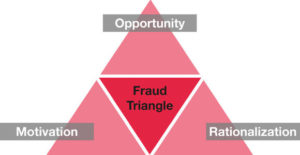
This week’s blog post may be of greatest interest to our past and present Business Management students. It covers the latter half of the agenda of the Women in Business Network event – occupational fraud. The talk was given by Robert Kelly FCA CFE who is Operations Director at FraudEdge. Robert outlined what signs businesses should watch out for and how they can protect against internal fraud at work. 76% of companies report suffering from at least one type of fraud (Kroll 2015) – so this is something that all business owners should worry about.
Before you go on to read this article you might like to take a look at this video which may help to explain why so much fraud is missed by management or auditors:
What is occupational fraud?
Fraud is defined as an intentional act of deceit to obtain an unjust or illegal advantage.
Occupational fraud is the use of one’s occupation for personal enrichment through deliberate misuse or misapplication while employing an organisation’s resources or assets.
Both of these actions are criminal offences and fall under the remit of the Criminal Justice (Theft & Fraud) Act 2001 which covers:
- Obtaining services by deception
- Making a gain or causing a loss by deception
- False accounting
- Unlawful use of a computer
Some Common Types of Work-Related Fraud include bid rigging, invoice kickbacks, bribery, fictitious expenses, understated revenues, cash, employment credentials and understated sales.
So who is susceptible?
A fraud susceptible business might contain staff who perceive that they are poorly paid, staff who perceive that they have poor conditions of employment, staff with high levels of job dissatisfaction, high staff turnover, tolerance of petty fraud/abuses and/or unethical working practices.
3 Reasons Why People Commit Fraud

#1 Opportunity – some common examples:
- Management are preoccupied
- Staff cut backs/hiring freezes
- Ineffective accounting, information and control systems
- Ineffective monitoring of management
- Financials based on estimates
- Unusual or highly complex transactions
#2 Motivation (pressures) – some common examples:
- Personal financial need
- Greed
- Perceived or real adverse effects of reporting poor financial results
- Excessive pressure to meet financial targets
#3 Rationalization – some common examples:
- Detached – because I’m worth it
- Denial – just this one time, I’ll pay it back
- Decadent – everyone’s doing it
- Devoid – it’s for a good common purpose
How to Create an Effective Anti-Fraud Programme in Your Business
- Increase the effort it takes to commit a fraud
- Screen your staff – vet them (re-check CVs)
- Increase the risks of getting caught
10 Red Flags! Get to know your staff:

- Living beyond means
- Financial difficulties
- Control issues – unwillingness to share duties
- Unusually close relationship with customers/suppliers
- Wheeler dealer attitude
- Divorce/family problems
- Irritable/defensive
- Addiction problems
- Refusal to take holidays
- High staff turnover in department
What to do?
Robert advocates that businesses should develop an anti-fraud culture by eliminating provocations and excuses:
- Leadership – setting the tone at the top
- Clear statement of expected behaviours
- Regular fraud awareness training
- Adequate resourcing
- Zero tolerance & consistent follow through
Like to learn more?
Our Business Management distance learning course will give you a greater understanding of how to manage a business in Ireland today.
If you would like to know more about occupational fraud please contact Robert Kelly (FCA CFE) at FraudEdge Limited
Telephone: (01) 517 5212
Email: robert@fraudedge.ie
